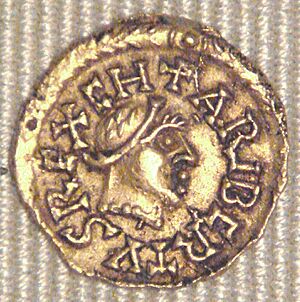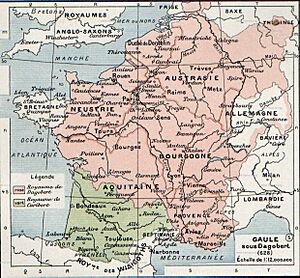Charibert II facts for kids

Charibert II was a king who ruled a part of the Frankish kingdoms called Aquitaine for a short time. He was born sometime between 607 and 617 and died on April 8, 632. His father was Clotaire II, a powerful Frankish king, and his mother was Sichilde. Charibert's main city was Toulouse. He was a few years younger than his half-brother, Dagobert I.
Contents
Becoming King of Aquitaine
When his father, King Clotaire II, passed away in 629, Charibert wanted to become king of Neustria. This was a big part of the Frankish kingdom. However, his older half-brother, Dagobert I, was already king of another area called Austrasia since 623.
Negotiations for the Kingdom
During the talks about who would rule, Charibert was still young. His uncle, Brodulf, who was his mother's brother, spoke for him. Dagobert had Brodulf killed, but he did not stop Charibert from taking control of Aquitaine. Aquitaine was a region that was almost independent at the time.
A Peaceful Agreement
It seems that Charibert becoming king of Aquitaine did not cause any major problems between the brothers. In fact, in 631, Charibert even became the godfather to Dagobert's son, Sigebert III. This shows they had a peaceful relationship, at least for a while.
Charibert's Kingdom
Charibert's kingdom included several important cities. These were Toulouse, Cahors, Agen, Périgueux, and Saintes. He also added his lands in Gascony to his kingdom.
Subduing the Basques
Charibert had a strong army. He used his forces to bring the Basques under his control. The Basques lived in a region called Novempopulania. Eventually, this whole area, which later became known as the Duchy of Vasconia, was ruled by Charibert. He was married to a woman named Gisela, who was the daughter of Amand, a ruler of the Gascons.
Death and Legacy
In 632, Charibert died in a place called Blaye, which is in Gironde. Not long after his death, his young son, Chilperic, also passed away. After this, Aquitaine became part of Dagobert's kingdom again. Both Charibert and his son are buried in the old Romanesque church called the Basilica of Saint-Romain in Blaye.
 | Aurelia Browder |
 | Nannie Helen Burroughs |
 | Michelle Alexander |


